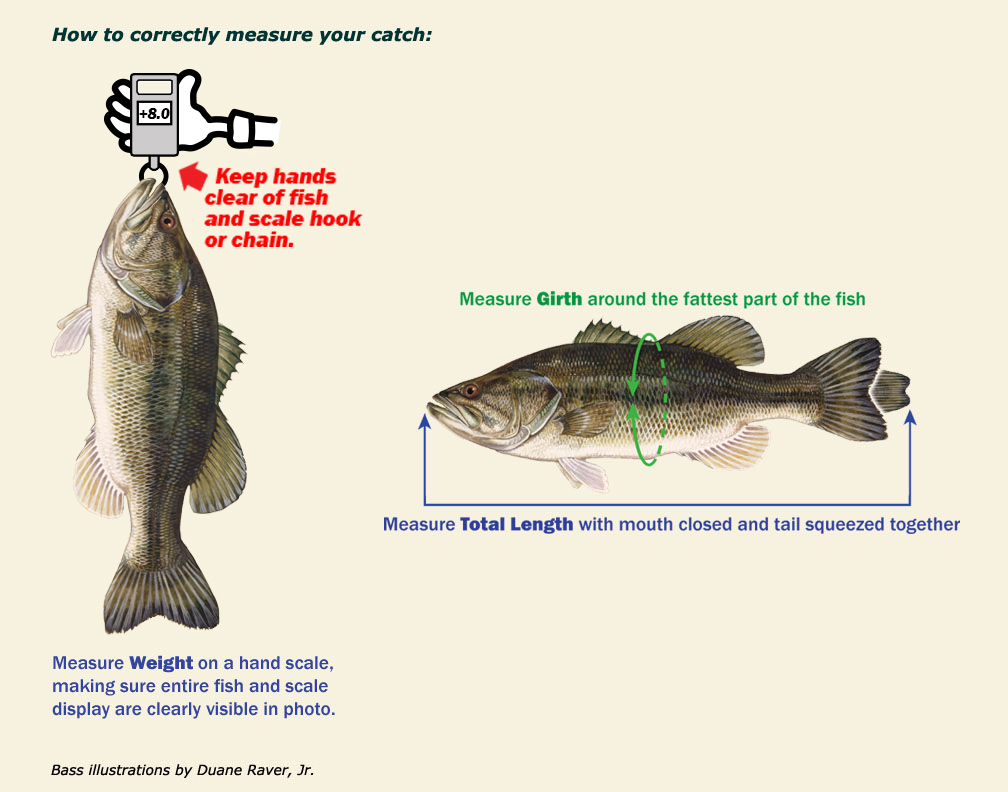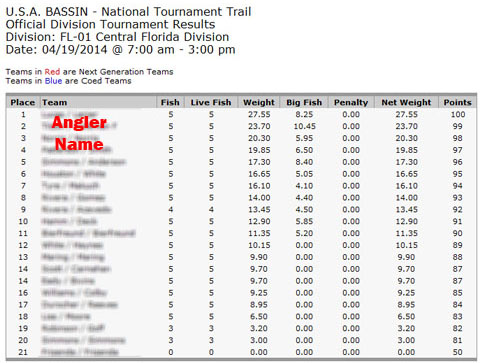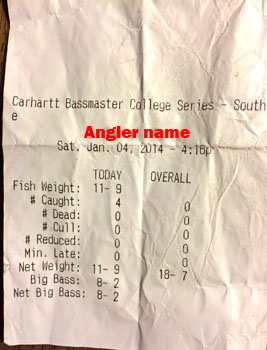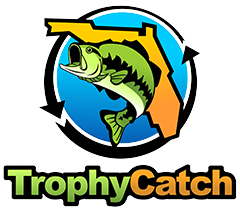TrophyCare | State Record Rules
Overview
TrophyCatch is a citizen-science conservation rewards program for bass anglers that emphasizes live-release of largemouth and Florida bass weighing eight pounds and heavier. TrophyCatch submissions will be accepted year-round and require documentation for verification as explained below. However, for rewards and rule consistency, TrophyCatch is divided into seasons that begin on October 1st and end on September 30th the following year. For instance, Season 1 ran from October 1st, 2012, through September 30th, 2013. To earn rewards, all bass must be caught and submitted within the current season. However, anglers have until October 15th to submit a catch from the prior season. Therefore, announcements of the TrophyCatch champion for each season will not take place until the end of the calendar year.
All bass submitted to TrophyCatch must be immediately released alive in the same water system where they were caught, and all participants must abide by State Regulations, including the length and bag possession limits.
The FWC reserves the right to modify these rules to ensure accurate weight information is collected for research and to ensure the live release of trophy bass back into the water system where they were caught. Decisions by FWC staff to approve or deny catches and/or program participation will be final based on the information submitted by the angler and the biologists’ expertise, experience with trophy-sized bass, and fisheries evaluations, including, but not limited to photo analytics results.
Please review new rules added to Season 14 indicated by italics.
Table of Contents
1. How to Document your Catch
2. Photo/Video Requirements
3. Scale Requirements
4. Submission Requirements
5. Awarding of Prizes
6. Terms for Participation
7. Inquiries
1. How to Document your catch
1.A. Angler Self-Documents Catch
1.A.1. Anglers must submit at least one photograph/video displaying the entire fish from tail-to-scale, with a readable weight clearly visible on the scale.

1.A.2. Submissions with photos or videos taken at a steep angle that only show the bass’ head and mouth must include an additional measurement or brag photo/video where the entire fish is visible.
1.A.3. Additional photo/video documentation can assist with processing submissions. Anglers are encouraged but not required to submit three or four additional photographs/videos of the fish. Examples are the whole fish on a measuring board with the length and/or girth measurements clearly visible, being released, a video of the scale being tarred or zeroed before locking on a weight, and/or a brag photo of themselves with their catch.
1.A.4. Outside of Florida State Record Certification and tournaments utilizing a Bass Tournament Permit Exemption, for the purpose of TrophyCatch, bass may be temporarily possessed for no more than 15 minutes for documentation.
1.B. Tournament Catches
1.B.1. Traditional Tournaments is defined by TrophyCatch as a fishing event where fish are weighed on an official tournament scale (not weighed by an angler on a personal scale) and consisting of at least 6 registered anglers.
1.B.2. Non-traditional tournaments are fishing events where fish are weighed by an angler on hand-held, basket, or personal scale. Anglers should follow section 1.A Angler Self Documents Catch to document their catch.
1.B.3. Online Tournament Verification must include a link to a specific tournament, sponsor, published newspaper, official club/tournament social media page or magazine article website with official tournament results. Tournament results must include your name, verified weight of the individual fish, along with the date and location of the tournament. Use the actual link to a publicly accessible website (no login required) that shows specific catch details.

1.B.4. Designated tournament directors may document the catch by communicating official tournament results to TrophyCatch Staff ([email protected]).
1.B.5. Printed Weigh Slip Documentation can include a scan, PDF or photo of an official printed tournament weigh slip with the tournament information that includes your name, the verified weight of the individual fish, tournament date, and location.

1.C. FWC Witness
If a Florida Fish and Wildlife Conservation Commission (FWC) employee or working FWC Volunteer witnesses the weighing of a possible TrophyCatch bass, the angler must include the first and last name of the FWC witness at the time of submission as documentation of the applicable catch.
2. Photo/Video Requirements
2.A. Anglers should submit high resolution photographs (good overall clarity, 3-megapixel camera or above recommended) that are clear enough to validate the submission.
2.B. Anglers may upload a video snippet, up to 50 MB in size for one or more of the photos or videos. Suggested documentation includes beginning with a wide angle showing the entire fish (scanning the fish from the tip of the tail to scale) being properly held on the scale and then zooming in to ensure the weight can be read.
2.C. Each digital weight photo/video must be an original unmodified photograph/video (no screenshots or photo of another photo). Metadata will be used to verify information about the catch, and it will supersede the angler's submitted catch data if an inconsistency occurs.
2.D. Supplemental photos/videos of the angler holding or releasing the bass, close-ups of the scale with at least half of the fish visible, images of the entire fish on a bump-board or tape-measure, and girth photos are encouraged to be submitted. Additional documentation can assist during the Approval Process. However, the required photo is of the entire bass, including tagged bass, on the scale with the weight clearly visible. See TrophyCare page for proper techniques and tips.
2.E. Provided links to assist in providing additional weight/length documentation for the submitted bass must lead to publicly accessible social media or websites.
2.F. Anglers must legally catch all fish submitted to TrophyCatch. Anglers must possess a proper freshwater license or exemption at the time of the catch, have caught the bass in Florida waters using an active hook-and-line method (bush hooks, snatch hooks, set lines, trotlines are excluded as a method to take largemouth and Florida bass), and have documented the catch following all TrophyCatch requirements.
3. Scale Requirements
3.A. All scales must be used in accordance with the manufacturer’s instructions.
3.B. All scales must be properly tared in accordance with the manufacturer's instructions.
3.C. Any modification and/or manipulation of a scale that results in misrepresentation of a bass’ actual weight is grounds for denial of the submission and disinvitation to participate in TrophyCatch.
3.D. Hand scales must be held by the designated handle without interfering with or touching the chain, shaft, or the fish while weighing.
3.E. Visit TrophyCare for more information on how to use and interpret the weight on your scale.
3.F. When using a pan scale where a type of weighing bin (e.g., basket, tub, pan etc.) is used to hold the fish on the scale, the submitted photo should include the entire fish and the entire weighing bin clearly showing all sides and corners and the scale with the weight visible.
3.G. The TrophyCatch submitted weight must be the primary weight displayed on the scale.
4. Submission Requirements
Submitted documentation will be reviewed by a team of biologists who will use all tools to approve or deny submissions.
4.A. Each submission must be a unique catch and resubmission of a single catch is grounds for denial of the submission and disinvitation to participate in TrophyCatch.
4.B. Anglers who demonstrate a trend of submitting bass that fall outside of the established quality control guidelines may be required to provide additional documentation.
4.C. Anglers must attest that they successfully live-released the bass in the water system where it was caught (after documenting it) and that it was able to swim off. Bass submitted to the program cannot be harvested or relocated.
4.D. Bass must be handled in accordance with TrophyCare guidelines and live-released in order to qualify for TrophyCatch.
4.E. For purposes of TrophyCatch, temporary possession can be no more than 15 minutes for documentation.
4.F. Submitted documentation will be reviewed by a team of biologists with all available tools. The team will use their professional judgement, research, media modifications, or photo analytic testing to evaluate submissions.
4.G. Submissions may be denied if: a fish’s weight is not clearly visible, does not show the entire fish, or the submission is questionable in terms of the size of the fish, catch location, or method of catch. If the submitted weight falls outside the photo analytic test by +/- 2 lbs., the submission will be denied.
4.H. Submissions to TrophyCatch that are legally caught but do not meet the program’s criteria will be considered for inclusion for the Big Catch program (BigCatchFlorida.com).
4.I. Your submission to this program, including photos and other data provided to the TrophyCatch program, constitutes a release and license to TrophyCatch and the Florida Fish and Wildlife Conservation Commission for use without compensation in perpetuity. Such use would typically include research, informational, and other public purposes, such as being posted on TrophyCatchFlorida.com, BigCatchFlorida.com, social media outlets, other third-party promotional use such as websites or publications, and in other related news releases, articles, brochures, advertisements, or reports.
5. Awarding of Prizes
5.A. Neither the FWC nor the State of Florida endorse any individual company, and each company is solely responsible for their products/services and fulfillment of any offers.
5.B. Product prizes may require additional processing and delivery time.
5.C. Winners of the Phoenix boat drawing will be randomly selected from qualified TrophyCatch registrations and approved bass. Odds of winning will depend on the number of eligible registrants and approved catches received during the current season.
5.D. Participants are responsible for all applicable taxes on both cash and product prizes/awards.
5.E. By entering into the drawing and/or by accepting any prizes, each entrant hereby releases and holds harmless the Florida Fish and Wildlife Conservation Commission, drawing sponsor(s), drawing prize provider(s), and any of their commissioners, directors, officers, employees, volunteers, agents and representatives from and against any and all liabilities, costs, expenses, claims, and damages for which the FWC, drawing sponsor(s), and/or drawing prize provider(s) might otherwise become liable by reason of any accidents, or injuries to or death of any persons, or damage to property, or both, in any manner arising or resulting from, caused by, connected with or related to entering the drawing and/or accepting any prizes, regardless of how, where, or when such injury, death or damage occurs even if caused by the negligence of the FWC, drawing sponsor(s), and/or drawing prize provider(s).
5.F. State laws prohibit false claims or fraud when claiming prizes; moreover, a decision is at FWC discretion and is final, if the legality or size of the catch is in question. FWC reserves the right to deny prizing or further participation in the TrophyCatch program or any other FWC-affiliated program if FWC determines that a submission was submitted fraudulently. Fraudulent submissions may include, but are not limited to, submitting photos not belonging to the individual claiming them to be theirs, altering photos or documents, claiming fish was caught in an area where it was not, recording a false weight or length, and any other act of dishonesty or fraud meant to circumvent the rules of this program. Any person who is denied an entry or prize will be notified.
5.G. All FWC employees are ineligible to win prizes other than picture and certificate level recognition.
5.H. TrophyCatch reserves the right to limit prizing in the event of multiple submissions from an angler during the same season.
5.I. TrophyCatch participants are also eligible to participate in varying monthly promotions, which will be advertised each month on the (https://www.facebook.com/TrophyCatchFlorida) and Instagram page (https://www.instagram.com/fishreelflorida/). The prizes for these promotions vary from the TrophyCatch general prizing, but TrophyCatch program rules must still be followed for participants to be eligible to receive the monthly promotion prizes. Monthly promotion rules and prizes may vary and the FWC and TrophyCatch reserves the right to modify monthly promotion rules and prizes. Monthly promotion rules will be listed with each promotion announcement. By participating in any Facebook promotions, the participant agrees that their participation constitutes a complete release of Facebook and that this promotion is in no way sponsored, endorsed or administered by, or associated with Facebook. TrophyCatch and the FWC are not responsible for the actions, content, information, or data of persons submitting photos or other third parties, on Instagram or Facebook.
5.J. It is the angler’s responsibility to keep their contact information and license data current for prizing and “Additional Information” requests. TrophyCatch and partners will not replace prizes not received due to incorrect address or contact information on file.
6. Program Terms for Participation
To participate in TrophyCatch, the registered angler must have caught the submitted fish themselves, in accordance with the freshwater recreational fishing regulations of the State of Florida at the time of the catch. This includes, but is not limited to:
6.A. The angler must be properly licensed or have a statutory exemption.
6.B. The angler must use legal gear, meaning they must use an active hook-and-line method, which does not include bush hooks, trotlines, or bow.
6.C. The angler must be fishing in fresh or brackish waters within the state of Florida, where the angler has legal access.
6.D. The angler must abide by all size, bag, season, and location-specific fishing regulations.
6.E. Any photo or video with 3 or more fish over 16 inches will result in automatic TrophyCatch denial unless if the fish were caught during a tournament utilizing a Bass Tournament Exemption Permit.
6.F. Youth under 18 years of age are required to have their parent or guardian’s approval to participate.
6.G. Anglers should demonstrate respect for fellow anglers, TrophyCatch partners, FWC staff and the general public at all times.
6.H. This program receives Federal financial assistance from the U.S. Fish and Wildlife Service. Under Title VI of the 1964 Civil Rights Act, Section 504 of the Rehabilitation Act of 1973, Title II of the Americans with Disabilities Act of 1990, the Age Discrimination Act of 1975, and Title IX of the Education Amendments of 1972, the U.S. Department of the Interior prohibits discrimination on the basis of race, color, national origin, age, sex, or disability. If you believe that you have been discriminated against in any program, activity, or facility, or if you need more information, please write to: Office of Diversity, Inclusion and Civil Rights Department of the Interior 1849 C Street, NW Washington, D.C. 20240.
7. Inquiries
7.A. All program related questions call us at 1-855-FL-Trophy (1-855-358-7674).
7.B. All prizing and program questions email us at [email protected] .
7.C. For questions about Fishing Licenses or Regulations please contact Licensing and Permitting .
7.D. For Florida State Record questions please contact the appropriate Regional Office .
Fish Handling Guidelines

